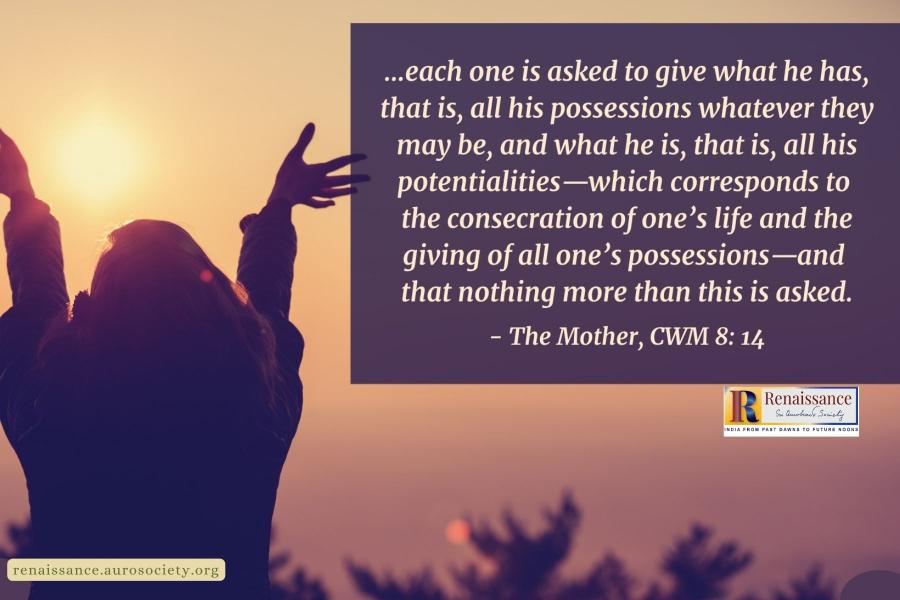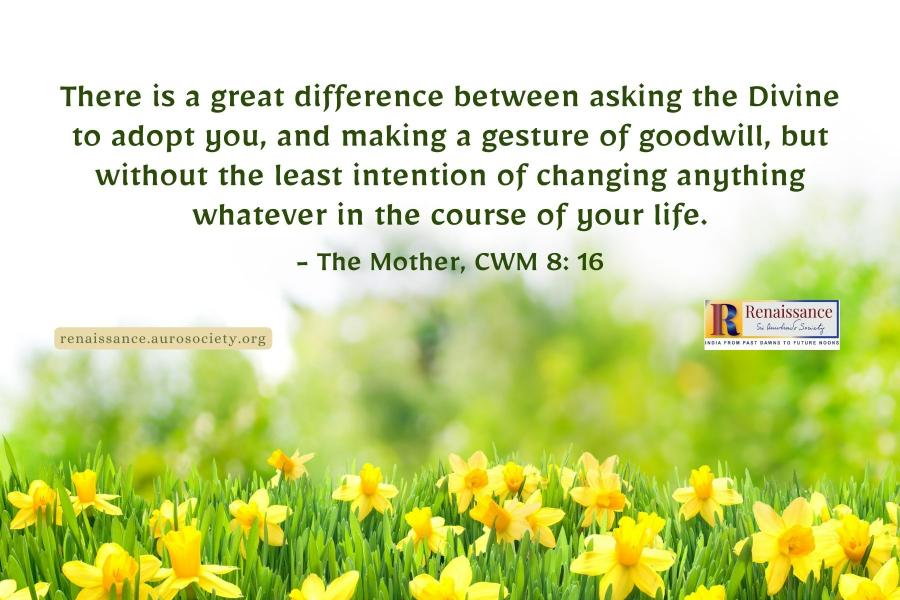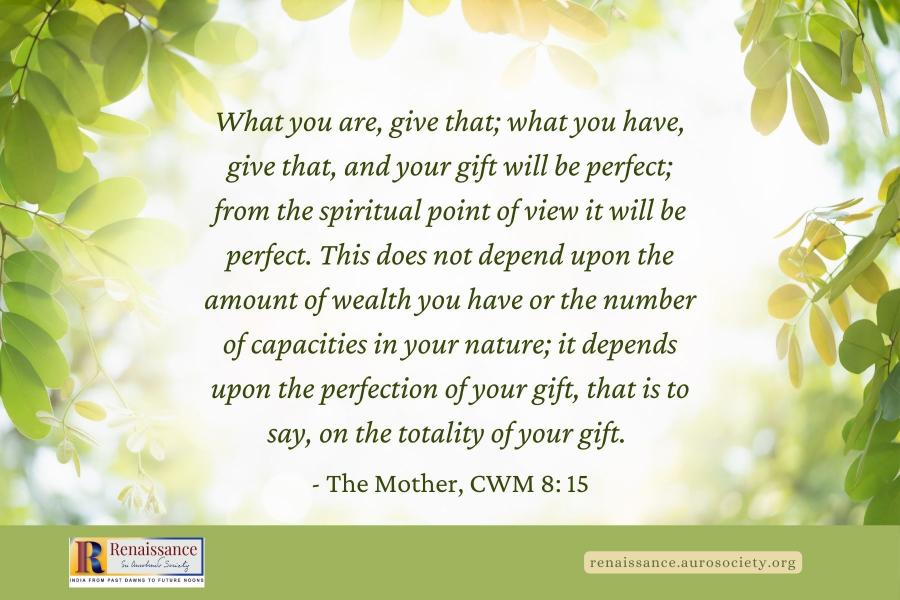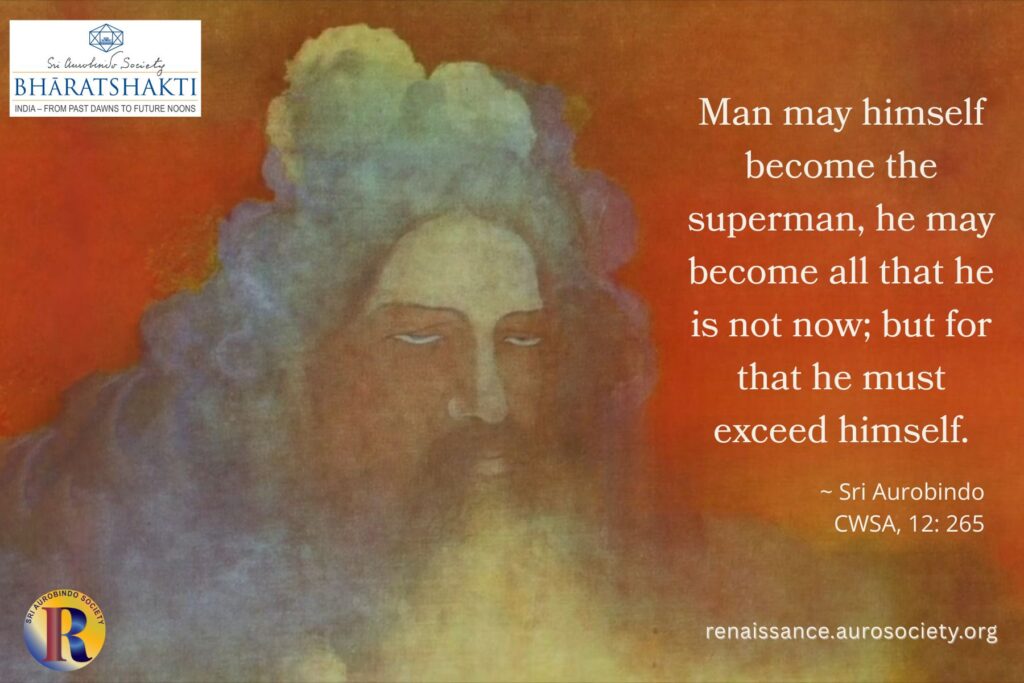Vol. III, Issue 5
Author: The Mother
Editor’s note: In this conversation the Mother speaks on giving oneself sincerely to the Divine without bargaining. She narrates a little story as an example of how to give all one has. She adds that while giving to the Divine only what one has in surplus is better than giving nothing, it is not perfect giving.

Each one is asked to give what he has and what he is
Quote of the Mother:
Give all you are, all you have, nothing more is asked of you but also nothing less.
~ CWM, Vol. 15, p. 49
Question: What is meant by “all you have” and “all you are”?
The Mother: I am going to tell you in what circumstances I wrote this; that will make you understand: Someone wrote to me saying that he was very unhappy, for he longed to have wonderful capacities to put at the disposal of the Divine, for the Realisation, for the Work; and that he also longed to have immense riches to be able to give them, to put them at the feet of the Divine for the Work.
So I replied to him that he need not be unhappy, that each one is asked to give what he has, that is, all his possessions whatever they may be, and what he is, that is, all his potentialities—which corresponds to the consecration of one’s life and the giving of all one’s possessions—and that nothing more than this is asked.
What you are, give that; what you have, give that, and your gift will be perfect; from the spiritual point of view it will be perfect. This does not depend upon the amount of wealth you have or the number of capacities in your nature; it depends upon the perfection of your gift, that is to say, on the totality of your gift.
I remember having read, in a book of Indian legends, a story like this. There was a very poor, very old woman who had nothing, who was quite destitute, who lived in a miserable little hut, and who had been given a fruit. It was a mango. She had eaten half of it and kept the other half for the next day, because it was something so marvellous that she did not often happen to get it—a mango.
And then, when night fell, someone knocked at the rickety door and asked for hospitality. And this someone came in and told her he wanted shelter and was hungry. So she said to him, “Well, I have no fire to warm you, I have no blanket to cover you, and I have half a mango left, that is all I have, if you want it; I have eaten half of it.”
And it turned out that this someone was Shiva, and that she was filled with an inner glory, for she had made a perfect gift of herself and all she had.
I read that, I found it magnificent. Well, yes, this describes it vividly. It’s exactly that.

Read: “One is unhappy only when one is not generous”
The rich man, or even people who are quite well-off and have all sorts of things in life and give to the Divine what they have in surplus—for usually this is the gesture: one has a little more money than one needs, one has a few more things than one needs, and so, generously, one gives that to the Divine. It is better than giving nothing. But even if this “little more” than what they need represents lakhs of rupees, the gift is less perfect than the one of half the mango.
For it is not by the quantity or the quality that it is measured: it is by the sincerity of the giving and the absoluteness of the giving.
Consecrate oneself to the Divine
Question: But in ordinary life, when rich men want to give their wealth to the Divine, and the Divine is not in front of them, then to whom are they to give? They don’t know where to give their money!
The Mother: Yes, but then the question doesn’t arise. If they haven’t met the Divine either within or without, it doesn’t come into question. They are not asked to give to someone they do not know. If they have found the Divine within themselves, well, they have only to follow the indication given by the Divine for the use of what they have; and if they follow quite sincerely and exactly the indications they receive, this is all that can be asked of them. But until then nothing is asked of anyone.
One begins to ask only when someone says, “Here I am, I want to consecrate myself to the Divine.” Then it is all right, from that moment one asks; but not before. Before that, even if you casually pull out a coin from your pocket and put it there, it is very good; you have done what you thought you ought to do and that’s all; you are not asked for anything at all.
There is a great difference between asking the Divine to adopt you, and making a gesture of goodwill, but without the least intention of changing anything whatever in the course of your life.
Those who live the ordinary life, well, if they make a gesture of goodwill, so much the better for them, this creates for them antecedents for future lives. But it is only from the moment you say, “There, now I know that there is but one thing which counts for me, it is the divine life, and I want to live the divine life”—from that moment one asks you, not before.

Give sincerely without bargaining
Question: Mother, there are people who come here, who have money and are very devoted, who show their devotion, but when the question of money comes up, they bargain…. Then how shall we remain on friendly terms with them?
The Mother: They come with the idea of taking from the Divine all they can: all the qualities, all the capacities, all the conveniences also, all the forts, everything, and sometimes even powers, and all the rest. They come to take, they don’t come to give. And their show of devotion is simply a cloak they have thrown over their wish to take, to receive.
That covers a wide field: from saving one’s soul, having spiritual experiences, obtaining powers, to leading a petty quiet life, comfortable—more or less comfortable, at least with a minimum of comfort—without cares, without botheration, far from the worries of life. That’s how it is. That covers a wide range.
But when they give, it is a kind of bargaining; they know that to obtain these things, it would be well to give a little something, otherwise they won’t get them, so they make a show of being very devoted. But it is only a pretence, for it is not sincere.
Unfortunately for them, it deceives no one. It may be tolerated; but that doesn’t mean that anybody is deceived. The bargaining is everywhere, in all the parts of the being. It is always give and take, from the highest spiritual experiences to the tiniest little material needs. There is not one in a thousand who gives without bargaining.
And the beauty of the story I told you—moreover, there are many others like it here—is just this, that when the old woman gave, she didn’t know that it was Shiva. She gave to the passing beggar, for the joy of doing good, of giving, not because he was a god and she hoped to have salvation or some knowledge in exchange.
– The Mother, CWM, Vol. 8, pp. 14-18

Also Read: Be Generous, Be Sincere, and Evolve

~ Design: Raamkumar



